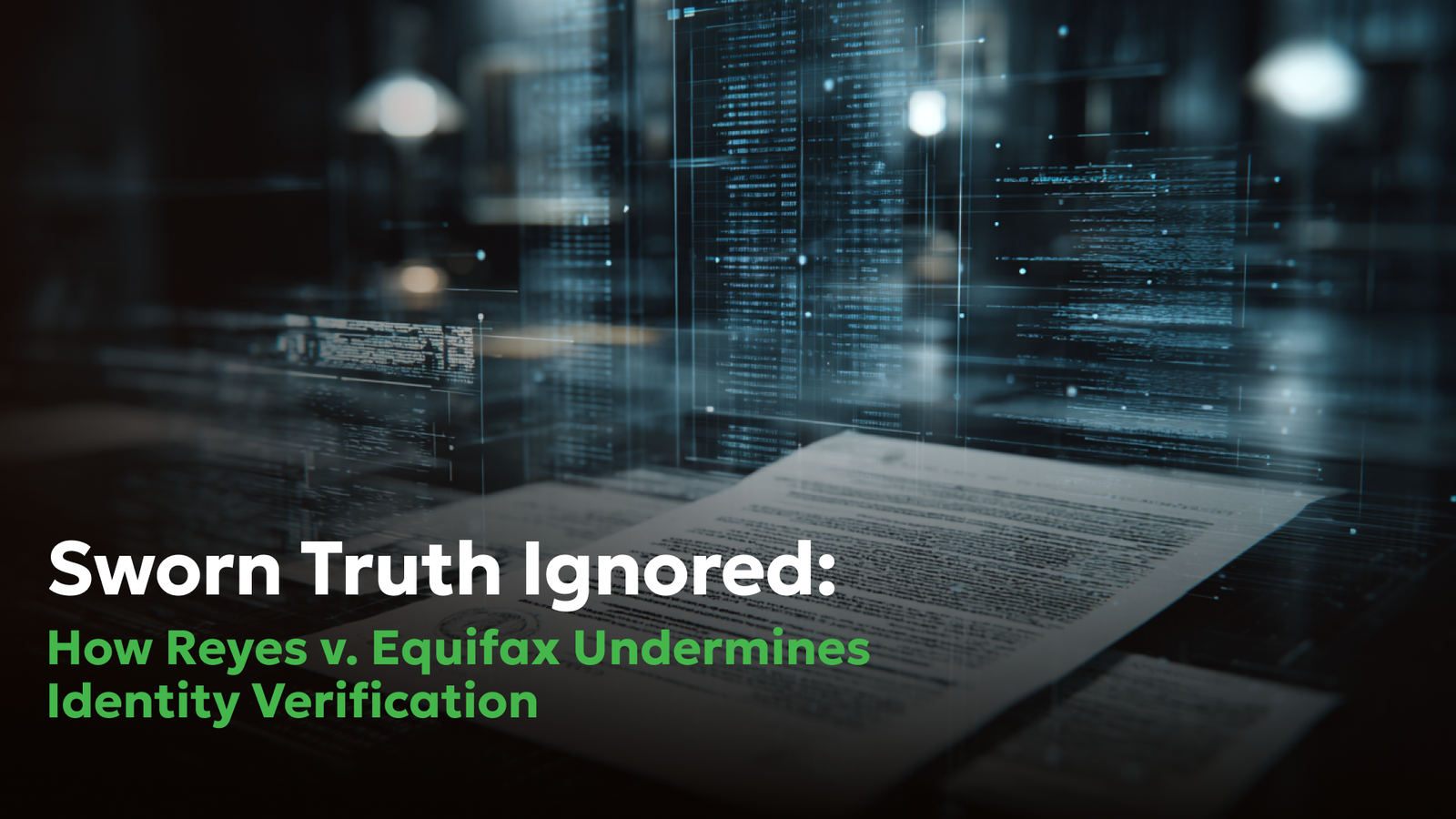Identity Theft in California: How the FCBA, EFTA and FCRA Protect You - and What to Do Next
- Blog
- Credit Report Identity Theft
Identity Theft in California: How the FCBA, EFTA and FCRA Protect You - and What to Do Next

Identity Theft in California: How the FCBA, EFTA and FCRA Protect You - and What to Do Next
California has long been a hotspot for identity theft, thanks to its large population, tech-driven economy, and concentration of data-driven businesses. From Los Angeles to Sacramento, thousands of consumers each year discover that their personal information has been misused - credit cards opened in their name, bank accounts drained, or credit reports wrecked by fraudulent activity. If you’ve been a victim of identity theft in California, federal laws like the Fair Credit Billing Act (FCBA), Electronic Fund Transfer Act (EFTA), and Fair Credit Reporting Act (FCRA) offer critical protections.
This article breaks down how these federal laws work, what legal remedies are available to Californians, and why hiring an experienced identity theft lawyer in California can be the smartest move you make.
Eye‑Opening Identity Theft Stats in California You Need to Know
- California ranks 3rd in the U.S. for identity theft reports per 100,000 residents, with 101,639 reports, and 21st in total fraud-related reports (243,620).
- Identity theft accounted for 29% of all fraud reports in California, tied with imposter scams at 18% and credit bureau issues at 6%.
- Of the identity theft incidents, 64,878 were credit card fraud, representing 45% of all ID theft cases .
- Loan/lease fraud made up 10% (~14,977 cases); bank fraud 8% (~11,166); employment/tax-related fraud 5% (~6,850).
- California consumers reported $187.1 million in total fraud losses, with a median loss of $375 per victim.
- According to the FTC, in 2023, nationwide, over 1 million identity theft reports were filed via IdentityTheft.gov, including many from California.
- The FTC’s Sentinel Network received 5.4 million fraud and consumer protection reports in 2023, a significant portion from California.
- In 2024, UK-wide but reflective of U.S. trends, including California, 38% of consumers reporting fraud said they lost money (up from 27% in 2023); total fraud losses were $12.5 billion nationwide.
In 2022, nationwide, FTC’s IdentityTheft.gov received over 1.1 million identity theft reports, with California, the nation’s most populous state, contributing heavily to these figures.
The Legal Backbone: FCBA, EFTA & FCRA
1. Fair Credit Billing Act (FCBA)
The FCBA applies to open-end credit accounts such as credit cards. If someone racks up charges on your card without permission, you are not responsible for paying those unauthorized charges if you report them quickly.
Key FCBA protections include:
- Zero liability for unauthorized charges if reported before they are processed.
- $50 maximum liability if reported within 60 days of receiving the billing statement.
- A requirement for creditors to investigate and respond within two billing cycles (but no more than 90 days).
If your credit card has been used fraudulently or your creditor refuses to investigate unauthorized charges, contacting an identity theft attorney in California can ensure your rights are enforced under federal law.
2. Electronic Fund Transfer Act (EFTA)
The EFTA protects your debit cards and other electronic fund transfers. If your bank account is accessed without authorization - through stolen debit cards, hacked online accounts, or skimming devices - the EFTA limits your liability and mandates prompt investigation by the bank.
Under the EFTA, California residents have:
- A $50 liability cap if unauthorized activity is reported within two business days.
- A $500 cap if reported after two days but within 60 days of the statement.
- The right to full reimbursement if the report is made within 60 days.
If your bank fails to restore stolen funds or ignores your complaint, an identity theft lawyer in California can help file a claim under the EFTA and pursue financial compensation.
3. Fair Credit Reporting Act (FCRA)
The FCRA governs the accuracy of your credit reports and the responsibilities of credit reporting agencies (CRAs) and information furnishers. If identity theft results in inaccurate accounts appearing on your credit report, the FCRA gives you powerful tools to correct the record.
FCRA identity theft protections include:
- The right to place a fraud alert or credit freeze on your file.
- The right to block fraudulent data from your report (15 U.S.C. § 1681c-2).
- The right to dispute inaccurate information and require a reinvestigation (15 U.S.C. § 1681i).
- The right to sue for damages if CRAs or furnishers fail to correct false data.
California In Practice – Identity Theft attorneys in California often have more tools at their disposal to layer on state claims (which may allow additional damages or leverage):
- California Civil Code § 1798.92 et seq. (Identity Theft Law): Provides a robust framework for identity theft victims, including:
- The ability to file a police report affidavit and use it to block information on your credit report.
- The right to bring a civil action against the thief, not just the data furnisher or CRA.
- California’s Consumer Credit Reporting Agencies Act supplements FCRA.
- The California Consumer Privacy Act (CCPA) gives broader rights to know, delete, and restrict use of your personal data, useful in cases where data breaches caused ID theft.
Real California Scenarios: When the Law Kicks In
Case 1: Fraudulent Credit Cards in San Diego
A San Diego teacher applies for a home loan and is shocked to be denied due to several unpaid credit cards she never opened. Upon pulling her credit report, she finds accounts from multiple lenders she’s never used. After trying to dispute the accounts on her own with no response, she turns to an identity theft lawyer in California, who files claims under the FCRA and gets the accounts deleted and her credit score restored.
Case 2: Unauthorized Bank Withdrawals in Oakland
A man in Oakland discovers his checking account has been used to make over $2,000 in unauthorized online purchases. His bank blames him and refuses reimbursement. With the help of an identity theft attorney in California, he files a complaint under the EFTA and successfully recovers the stolen funds and additional damages.
Case 3: Fraudulent Accounts on Credit Reports in Los Angeles
A Los Angeles resident attempts to lease an apartment and is unexpectedly denied. When he pulls his credit report, he discovers multiple accounts in collections that he never opened. These fraudulent accounts, the result of identity theft, have severely damaged his credit score. Despite disputing the information, the credit bureaus fail to remove the accounts. With the help of an identity theft lawyer in California, he files a lawsuit under the FCRA. The legal action results in the deletion of the fraudulent accounts, financial compensation for the emotional and financial harm, and a fully restored credit report.
What Should You Do if You’re a Victim of Identity Theft in California?
- Get Your Credit Reports
Order your credit reports from Experian, Equifax, TransUnion, and Innovis. Look for accounts, inquiries, and addresses you don’t recognize. - File a Police Report and FTC Identity Theft Report
These documents are crucial if you plan to invoke your rights under the FCRA to block fraudulent data. - Dispute the Fraudulent Items
Send certified dispute letters to the credit bureaus and the companies that reported the information. If you’re unsure how to dispute identity theft on a credit report in California, consult a legal professional to make sure it's done right. - Hire an Identity Theft Attorney in California
If your disputes are ignored or denied - or if you face serious financial or emotional harm - you may be entitled to compensation. An experienced lawyer can enforce your rights and take the burden off your shoulders.
Here's a concise shortlist on how to dispute identity theft on a credit report in California:
You have the right to dispute credit reports, but a skilled identity theft attorney in California can walk you through every step and take legal action if necessary.
- Get Your Credit Reports
Request free reports from Experian, Equifax, and TransUnion at annualcreditreport.com. - Identify Fraudulent Items
Look for accounts, inquiries, or addresses you don’t recognize. - File an Identity Theft Report
Complete a report at identitytheft.gov and file a police report with your local California law enforcement. - Send a Dispute Letter to Each Credit Bureau
Include:- A detailed explanation
- A copy of your identity theft report
- Proof of identity (ID, utility bill, etc.)
- Request a Block Under FCRA § 1681c-2
This requires bureaus to remove fraudulent items permanently within four business days. - Monitor Your Reports & Follow Up
If the bureaus don’t respond or fail to remove the items, consider legal action. - Consult an Identity Theft Attorney in California
A lawyer can ensure your rights are protected and help pursue damages if your disputes are ignored.
Why Legal Help Matters
Fighting identity theft is overwhelming, especially when you're trying to recover lost funds, fix your credit, and restore your reputation. That’s where Consumer Attorneys comes in.
At Consumer Attorneys, we are committed to helping California residents take action against identity theft. Our experienced identity theft attorneys in California specialize in enforcing the FCBA, EFTA, and FCRA. Whether you’re dealing with fraudulent credit cards, unauthorized bank transfers, or a ruined credit report, we can help you fix the damage and hold the responsible parties accountable.
We work on a contingency fee basis, meaning you don’t pay us unless we win your case. We’ll guide you through every step - from collecting evidence and filing disputes to suing credit bureaus, banks, or lenders when necessary.
Final Thoughts
Identity theft is a serious issue in California, but you are not powerless. Whether you’re a student in Sacramento, a small business owner in San Jose, or a parent in Fresno, you have federal protections on your side. Knowing how to dispute identity theft on a credit report in California is just the beginning. With legal support, you can reclaim your credit, your finances, and your peace of mind.
If you're looking for a proven identity theft lawyer in California, Consumer Attorneys is here to help. Contact us today to schedule a free case review.
Frequently Asked Questions
Immediately order your credit reports, file an Identity Theft Report with the FTC, and submit a police report. These documents will help you dispute fraudulent accounts and invoke your rights under the FCRA.
If reported before the charges are processed, you have zero liability. If reported within 60 days of your statement, your maximum liability is $50.
The FCRA ensures that you can dispute and block fraudulent items on your credit report, place fraud alerts or freezes, and sue credit bureaus or furnishers that don’t correct false information.
You may be able to file a lawsuit under the FCRA. You can also work with an identity theft attorney in California to pursue damages and have your credit corrected.
Yes. California Civil Code § 1798.92 provides state-level identity theft protections, allowing you to block credit data and sue the thief, not just the credit bureau or creditor.
Yes. Fraudulent data on your credit report can lead to loan denials, rejected rental applications, and employment issues. Prompt dispute and legal help are critical.
Most work on a contingency fee basis, meaning you pay nothing upfront, only if they win your case. This is ideal for victims already facing financial loss.
Yes. Under California Civil Code § 1798.93, you can sue the thief in civil court in addition to taking action against any companies that mishandled the data.


Daniel Cohen is the Founder of Consumer Attorneys. Daniel manages the firm’s branding, marketing, client intake and business development efforts. Since 2017, he is a member of the National Association of Consumer Advocates and the National Consumer Law Center. Mr. Cohen is a nationally-recognized practitioner of consumer protection law. He has a we... Read more
Related Articles




R
ONGS™You pay nothing. The law makes them pay.







